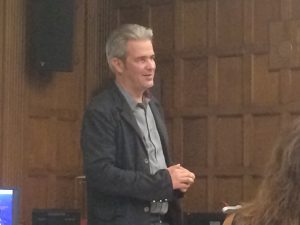Yesterday Per Urlaub, of Germanic Studies at the University of Texas at Austin, visited the CLS for a special talk on curricular change in university foreign language departments. Entitled “From Communicative Competence to Critical Literacy: Genre, Proficiency Levels, Strategies,” the talk was enthusiastically received by a room full of language instructors and others at Yale, Southern Connecticut State University, and beyond. In this post, I’ll jot down some notes that I took during the talk, and invite further questions and responses for the comments.
 Urlaub’s talk, echoing the 2007 MLA report on foreign languages in higher education, grew from an attempt to address the pervasive “two-tiered” undergraduate curriculum in U.S. colleges and universities. In this model, he said, the first two years of language study are typically characterized by a focus on oral communication instead of literacy; cultlure is taught “as trivia” and not critical cultural analysis; meanwhile, courses are often taught by TAs and almost never by tenure-line faculty. Then, in the second two years of language study, students engage in literary and cultural studies, without explicit attention being paid in class to linguistic development, and with little focus on oral communication. For their part, Urlaub siad, instructors by this point often assume that students can read critically in the target language–an assumption that doesn’t bear out in fact.
Urlaub’s talk, echoing the 2007 MLA report on foreign languages in higher education, grew from an attempt to address the pervasive “two-tiered” undergraduate curriculum in U.S. colleges and universities. In this model, he said, the first two years of language study are typically characterized by a focus on oral communication instead of literacy; cultlure is taught “as trivia” and not critical cultural analysis; meanwhile, courses are often taught by TAs and almost never by tenure-line faculty. Then, in the second two years of language study, students engage in literary and cultural studies, without explicit attention being paid in class to linguistic development, and with little focus on oral communication. For their part, Urlaub siad, instructors by this point often assume that students can read critically in the target language–an assumption that doesn’t bear out in fact.
As one way of working toward a solution to this gap between language-focused and literature-focused instruction, Urlaub posed two questions, and outlined some of his own responses:
- How to integrate more reading of authentic texts in the beginning language classroom (Years 1-2)? Why?
- How to make the teaching of literature in intermediate and advanced FL courses more communicative (Years 3-4)?
In response to the first, he argued for supplementing the communicative approach with more robust reading instruction. Specifically, drawing on the work of Heidi Bernhardt and others, he recommended having students initially do many cultural readings in their L1 initially, so that they can build cultural background knowledge for eventual transfer into the L2. He mentioned that this approach, while controversial in settings where the target language is used exclusively from Day 1, has great potential for long-lasting effects: L2 reading skills stay with undergraduate learners who’ve only taken foreign language classes in order to fulfill their language requirements much longer than do oral communication skills.
In response to the second, he proposed explicit instruction in reading comprehension strategies, defined by the National Reading Panel (2000) as “specific procedures that guide students to become aware of how well they are comprehending as they attempt to read and write.” Practically, this means exercises in prediction, summary, visualization, drawing connections, connecting ideas in the text to students’ background knowedge, and identifying key implicaitons of texts; his own strategy as a teacher, exemplified in his interactive Reading Comprehension Strategy Training website, is to not ask questions of the student, but rather have students formulate their own questions about the text (“Questioning as a reading strategy”).
Several engaged questions followed his talk, and we anticipate that more are to come in a follow-up Brown Bag discussion next Thursday from 12:30 – 1:30 at the CLS Library. Please feel free to RSVP for this conversation, and to leave any of your thoughts or questions on the topic right here.
Thank you again, Per!